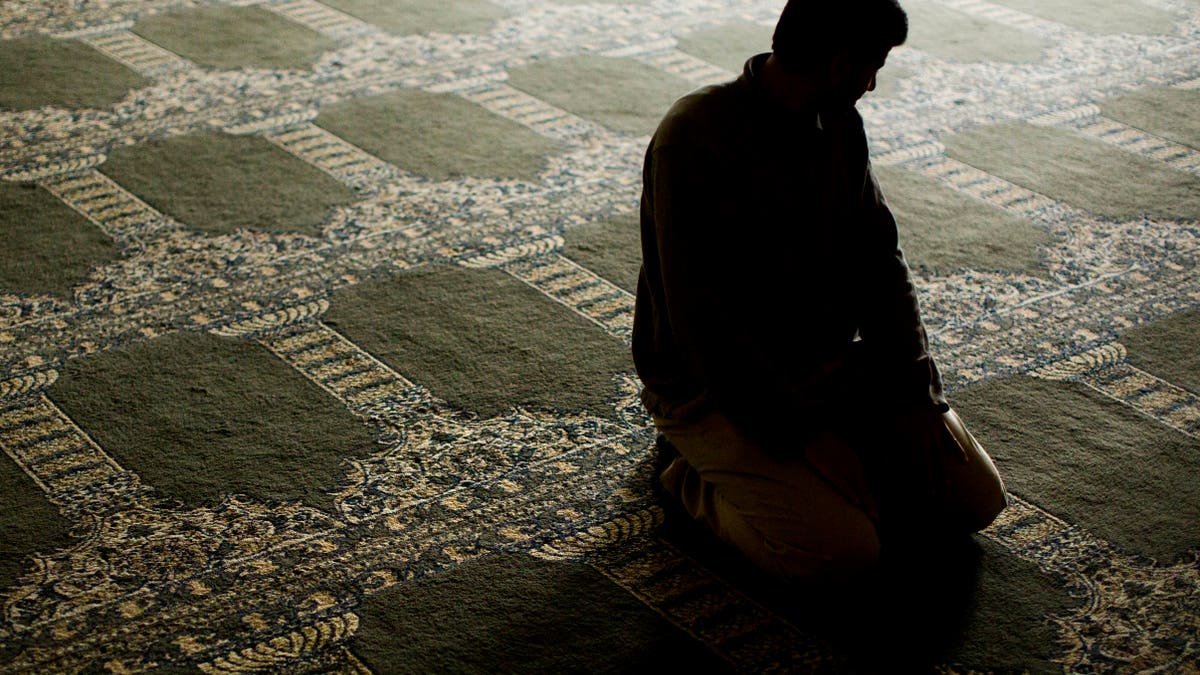
Nov. 18, 2015-- A Syrian refugee--photographed on condition of anonymity due to fear of retaliation against family living in Syria-- prays at the Muslim Association of Lehigh Valley in Whitehall, Pa. Dozens of Syrian refugee families have resettled in the Allentown, Pa., area, home to 1 of the nation's largest population of Syrians. (AP)
Thursday, the House voted 289 to 137 to press “pause” on bringing more Syrian refugees to the United States without first imposing even more stringent screening measures on the new arrivals fleeing the savagery, starvation and indiscriminate bombings of their nation’s civil war.
For the United States, a country that has a statue that's a symbol of freedom and liberty worldwide, this marks an erosion of the America whose citizens are bound by ideals and aspirations to forge, as the founders said, “a more perfect union.”
“More than any other country, our strength comes from our own immigrant heritage and capacity to welcome those from other lands,” said none other than President Ronald Reagan in 1981.
“Immigration and refugee policy is an important part of our past and fundamental to our national interest.”
Reagan was right. What makes America different, what makes the country at its best stand out among nations, is its capacity to absorb, appreciate and deploy the talents of its newcomers.
Reagan was right. What makes America different, what makes the country at its best stand out among nations, is its capacity to absorb, appreciate and deploy the talents of its newcomers.
We are a nation focused on what is ahead, not what you have left behind. We focus not on where your father came from, but where your life is headed. And we do so even in the face of tragedy. The attacks of 9/11 knew no ethnic or religious boundaries – Americans of all backgrounds were murdered in the air, on the ground and in the towers.
Fears for America’s safety are understandable. But in this case we really are speaking of the people fleeing the people we are fighting.
Months after the attacks of September 11, I stood in an apartment in Berlin and talked to a brother and sister whose parents happened to come from India. Both had been born in Germany and their mother tongue was German, though they spoke excellent English as well. In the course of heading out to grab a snack that evening we accidentally tapped the car next to us.
“Oh, no,” one of the twenty-somethings said. “They are going to say, see, the ‘Auslander’ (the German word for “foreigner”) - hit our car!”
I was a rather green reporter at the time and I wondered aloud how anyone could be considered a foreigner in a country where they had been born, raised and schooled?
“But you’re German?” I said. “You haven’t even lived in India. How could you be Indian?”
The young woman driving the car smiled at me and said that in Germany they were indeed foreigners. ‘Auslander’ in their own country. And while Germany’s immigration laws have since loosened a great deal to create greater paths for citizenship, I have never stopped thinking about that interview and what the right of the soil and the power of assimilation mean in America.
In the last few days I have been mulling these ideas over a great deal, especially as the conversation turned to whether or not we, as Americans, could safely absorb in our midst 10,000 foreigners fleeing the savagery and carnage of a civil war tearing their country limb from limb.
And that is why the question of just who is an “Auslander” and how we decide exactly who America takes in matters to who we are.
Today we are talking about the safety of welcoming Syrian refugees and whether the U.S. can remain secure if the country opens its doors and its schools and its homes to those fleeing the horror of war: parents who have seen their children tossed from their balconies onto the earth below by barrel bombs overhead. Children who have seen their schools blasted into rubble. Mothers no longer able to feed their children as war starves out entire neighborhoods.
We talk about the worries about welcoming Syrian refugees when, right now, the manhunt underway to find those responsible for the bloodshed in Paris is focused on Europeans.
Does this mean we will no longer permit Europeans to enter our borders?
The Syrians fleeing the fight have seen this kind of bloodshed happening in their own living rooms and they are working to escape the carnage.
The refugees seeking safety are fleeing the same violence – from Raqqa to Les Halles and Beirut to Bataclan – against which the United States is now fighting.
America is a nation whose strength is its ability to take those who are foreign and offer freedom, opportunity and a chance at a next chapter.
To take those who seek to escape horror and offer some shot at hope. To take those who are “Auslander” and make them our own.




















